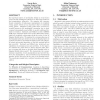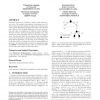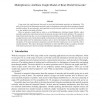276 search results - page 31 / 56 » Mathematical Modeling of Social Games |
104
click to vote
AAAI
2007
15 years 3 months ago
2007
Reciprocity is a key determinant of human behavior and has been well documented in the psychological and behavioral economics literature. This paper shows that reciprocity has sig...
116
click to vote
ATAL
2009
Springer
15 years 8 months ago
2009
Springer
An important aspect of mechanism design in social choice protocols and multiagent systems is to discourage insincere and manipulative behaviour. We examine the computational compl...
117
Voted
KDD
2010
ACM
14 years 12 months ago
2010
ACM
Assume a network (V, E) where a subset of the nodes in V are active. We consider the problem of selecting a set of k active nodes that best explain the observed activation state, ...
158
click to vote
WAW
2010
Springer
14 years 11 months ago
2010
Springer
Large scale real-world network data such as social and information networks are ubiquitous. The study of such social and information networks seeks to find patterns and explain th...
112
click to vote
ACSC
2004
IEEE
15 years 5 months ago
2004
IEEE
Table 1 shows the payoff to player one. The same matrix also holds for player two. Player one can gain the maximum 5 points (T = 5) by defection if player two cooperates. However,...



